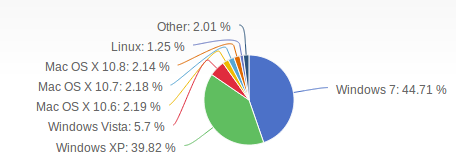Windows 8: Desperately seeking mobile


For Steve Ballmer, the good news is that people are using Windows 8. Both StatCounter and NetMarketShare show Windows 8 has cracked the entry-level 1 percent of the desktop market barrier in its first full month of availability. Unfortunately for Microsoft, a close reading of its adoption numbers shows bad news as well.
First, here are the numbers. Windows 8 has popped up from from 0.41 percent to 1.09 percent, a gain of 0.68 percent. That's not too surprising since, as anyone who went shopping on Black Friday knows, it was almost impossible to find PCs without Windows 8. However, Windows 7 hit a mark of 1.46 percent in its first full month out.
Thus, some of Windows 8's gains came at Windows 7's expense. Windows 7 barely moved up with a gain of 0.02 percent to reach 44.71 percent. Windows Vista--remember Vista?--continues to be the Windows that dare not speak its name with a loss of 0.10 percent to 5.70 percent, and XP dropped a quite large 0.84 percent to 39.82 percent. If you can do basic math, you can see the bad news for Microsoft here. Overall, Windows dropped 0.22 percent.
It's a tiny decline, but with as much energy as Microsoft has been putting into marketing Windows 8, it still has to be disappointing. For PC vendors, who were already worried by desktop sales declines, it's even worse news.
Who gained from Windows' slight fall? Who do you think? Apple, which reached an all-time high of 7.3 percent with Mac OS X, and Linux, hanging on as always, with a mark of 1.25 percent.
Taken in context, Windows 8's failure to do better against Apple is even more troubling for Microsoft. In the rapidly growing tablet and smartphone market, Windows is still disappointing.
True, all Windows Phone and tablet operating systems combined grew to 0.9 percent of the global market. Simultaneously, though, iOS kept its top spot by growing to 61.1 percent, while Android also kept growing and reached 28.02 percent. In short, while Java ME, BlackBerry, and Symbian keep declining, Apple and the Linux-powered Android devices are making much more of their fall than Microsoft.
When you look at other analysis, it's clear that the mobile space is a battle between Android and iOS. Indeed, Microsoft's latest offering here, Windows RT and Windows Phone 8, don't even show up on NetMarketShare's charts.
Still the good news for Microsoft here is... well actually I'm not sure there is any really good news here. Windows 8 isn't holding on to the desktop and its siblings on tablets and smartphones continue to be non-players.
Related Stories:
- How are Windows 8 sales? Still too early to tell
- StatCounter: Windows 8 license sales not yet translating into usage
- The browser wars seem to have settled into an uneasy truce
- Windows 7 overtakes XP; Mac OS X steams ahead of Vista
- Lenovo tops HP to become No. 1 PC maker
- Analyst: iPad 'cannibalizing' PC sales; nudging business Mac market